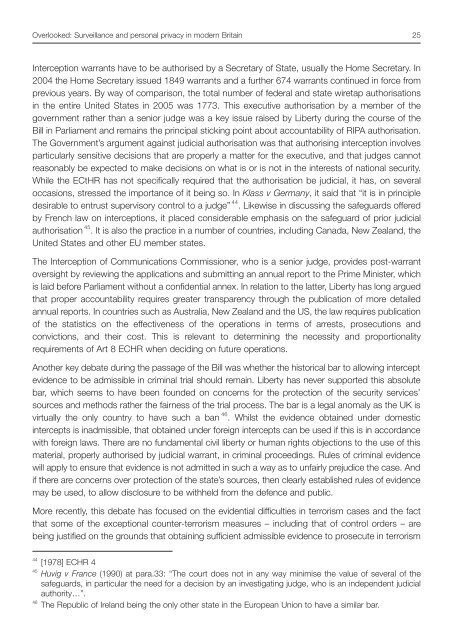Overlooked - Liberty
Overlooked - Liberty
Overlooked - Liberty
Create successful ePaper yourself
Turn your PDF publications into a flip-book with our unique Google optimized e-Paper software.
<strong>Overlooked</strong>: Surveillance and personal privacy in modern Britain 25<br />
Interception warrants have to be authorised by a Secretary of State, usually the Home Secretary. In<br />
2004 the Home Secretary issued 1849 warrants and a further 674 warrants continued in force from<br />
previous years. By way of comparison, the total number of federal and state wiretap authorisations<br />
in the entire United States in 2005 was 1773. This executive authorisation by a member of the<br />
government rather than a senior judge was a key issue raised by <strong>Liberty</strong> during the course of the<br />
Bill in Parliament and remains the principal sticking point about accountability of RIPA authorisation.<br />
The Government’s argument against judicial authorisation was that authorising interception involves<br />
particularly sensitive decisions that are properly a matter for the executive, and that judges cannot<br />
reasonably be expected to make decisions on what is or is not in the interests of national security.<br />
While the ECtHR has not specifically required that the authorisation be judicial, it has, on several<br />
occasions, stressed the importance of it being so. In Klass v Germany, it said that “it is in principle<br />
desirable to entrust supervisory control to a judge” 44 . Likewise in discussing the safeguards offered<br />
by French law on interceptions, it placed considerable emphasis on the safeguard of prior judicial<br />
authorisation 45 . It is also the practice in a number of countries, including Canada, New Zealand, the<br />
United States and other EU member states.<br />
The Interception of Communications Commissioner, who is a senior judge, provides post-warrant<br />
oversight by reviewing the applications and submitting an annual report to the Prime Minister, which<br />
is laid before Parliament without a confidential annex. In relation to the latter, <strong>Liberty</strong> has long argued<br />
that proper accountability requires greater transparency through the publication of more detailed<br />
annual reports. In countries such as Australia, New Zealand and the US, the law requires publication<br />
of the statistics on the effectiveness of the operations in terms of arrests, prosecutions and<br />
convictions, and their cost. This is relevant to determining the necessity and proportionality<br />
requirements of Art 8 ECHR when deciding on future operations.<br />
Another key debate during the passage of the Bill was whether the historical bar to allowing intercept<br />
evidence to be admissible in criminal trial should remain. <strong>Liberty</strong> has never supported this absolute<br />
bar, which seems to have been founded on concerns for the protection of the security services’<br />
sources and methods rather the fairness of the trial process. The bar is a legal anomaly as the UK is<br />
virtually the only country to have such a ban 46 . Whilst the evidence obtained under domestic<br />
intercepts is inadmissible, that obtained under foreign intercepts can be used if this is in accordance<br />
with foreign laws. There are no fundamental civil liberty or human rights objections to the use of this<br />
material, properly authorised by judicial warrant, in criminal proceedings. Rules of criminal evidence<br />
will apply to ensure that evidence is not admitted in such a way as to unfairly prejudice the case. And<br />
if there are concerns over protection of the state’s sources, then clearly established rules of evidence<br />
may be used, to allow disclosure to be withheld from the defence and public.<br />
More recently, this debate has focused on the evidential difficulties in terrorism cases and the fact<br />
that some of the exceptional counter-terrorism measures – including that of control orders – are<br />
being justified on the grounds that obtaining sufficient admissible evidence to prosecute in terrorism<br />
44<br />
[1978] ECHR 4<br />
45<br />
Huvig v France (1990) at para.33: “The court does not in any way minimise the value of several of the<br />
safeguards, in particular the need for a decision by an investigating judge, who is an independent judicial<br />
authority…”.<br />
46<br />
The Republic of Ireland being the only other state in the European Union to have a similar bar.















